Graham Reid | | 9 min read
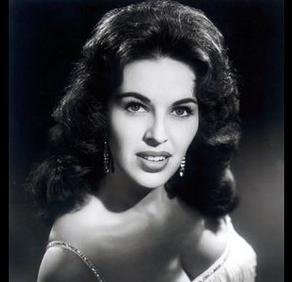
As a teenager barely out of school, Wanda
Jackson – “the sweet girl with the nasty voice” as she became
known – toured with and dated Elvis Presley;
scored minor hits with Mean
Mean Man,
Fujiyama
Mama
(big in Japan in '58) and her signature song, the
larynx-tearing invitation Let's
Have a Party
in 1960.
Let's
Have a Party
– which Presley had first sung – broke through when a radio DJ in
Des Moines, Iowa picked the track off a two-year old Jackson album,
started playing it and got a great response. He encouraged Capitol to
release it as a single and it became top 40 hit for Jackson.
Ironically
that hit came just as rockabilly and rock'n'roll – after the death
of Buddy Holly, Elvis in the army and Little Richard abandoning
rock'n'roll for the church – were dying out.
But
earlier, when few women singers let alone teenage girls were making
proto-rock'n'roll, the stylishly dressed Jackson who made her own clothes was on the frontline
having a ball. But working for it.
Although
Jackson's rockabilly days effectively ended within a few years of
Let's
Have a Party
her career continued: she returned to the country music she grew up
on as a child in Oklahoma, where she still lives with her
husband/manager of 40 years Wendell Goodman; she recorded gospel
throughout the Seventies, and in the Eighties the resurgence of rockabilly –
prompted by the Stray Cats who are huge Jackson fans – saw her old
albums reissued and she found regular rockabilly work in Europe.
And at
72, Jackson – the Queen of Rockabilly – is back again.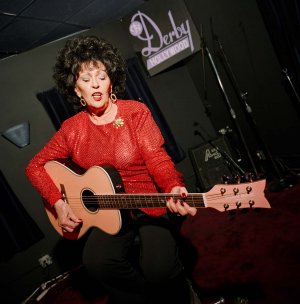
In
the mid Nineties she toured with Tex-Mex rocker Rosie Flores and connected
with a new audience of younger fans; in 2003 she recorded the Heart
Trouble
album which featured Elvis Costello, the Cramps, Dave Alvin and other
admirers; and last year she was inducted into the Rock and Roll Hall
of Fame as an Early Influence.
Improbably,
post-punk industrialists The Fall cover Jackson's Funnel
of Love
on their latest album; she played this year's SXSW festival in Austin
. . .and she has recorded a new album produced by longtime fan Jack
White (White Stripes/Raconteurs/Dead Weather).
The forthcoming album with White should take Jackson to a wide audience: the advance single is her tough cover of Amy Winehouse's You Know I'm No Good backed with a horn-driven version of Johnny Kidd and the Pirates 1960 stomper Shakin' All Over.
She spoke in May in advance of the album's release.
You have enjoyed a remarkable comeback
to rockabilly rock'n'roll in the past decade or so. It began with
Rosie Flores in '95 I think?
My, you've done your homework! Yes, I
recorded a couple of songs with Rose for an album of hers and it got
so much publicity that we went on tour across America for five weeks
– and it was at that point she introduced me to the new generation
of rockabilly and rock'n'roll fans . . . and the venues that were
available, which I knew nothing about.
I'd been working so much in Europe for
10 years to that point, so I didn't know what was going on in
America. I was shocked to see all the fans -- and the fact that they
knew my songs and would call out for them. I had to go back and
relearn some. So it has been a ride on the roller coaster since then.
Slim Jim Phantom of the Stray Cats told
me that rockabilly was the original American music . . but of course
it faded out.
It changed. Rock'n'roll didn't fade
out, but rockabilly had a very small window of time if you narrow it
down to a country artist singing this new style style of music. There
was only about five of us at that point – and then they began to
crop up everywhere and it began to change.”
Let's Have A Party became a hit when
the rock'n'roll era was almost done. But by then you had also gone back to country music. Did you
see rockabilly ending so you were getting out?
That came about purposefully. I began
recording rockabilly – I prefer to call our music Fifties Rock, the
original music – and I started recording in '56. I recorded a lot
of it, four singles a year and two albums was the contract I had with
Capitol Records.
But I could get no airplay. America was
having a hard time accepting Elvis and Jerry Lee and the men, so for
a teenage girl to come out singing it! They just weren't going to
help me and they wouldn't accept it. But I kept recording it and
finally I was putting a country song on one side and rock on the
other hoping to get airplay on one or the other.
But by 1960 I had just given up. I'd
put out albums with rock music and on singles but I couldn't get
airplay although they went over great on my personal appearances --
but I couldn't get play and therefore couldn't get sales.
So I went back to country – and that
point Let's Have a Party broke, it was pulled off my first album with
Capitol and I guess had been recorded in '56 [Actually '58]
So I backed in through rock'n'roll
again. And I'm glad to be back and feel very comfortable here.
People always say that rock'n'roll was
wild music but it was an innocent age? Was it really that innocent?
Some of those people were pretty knowing characters.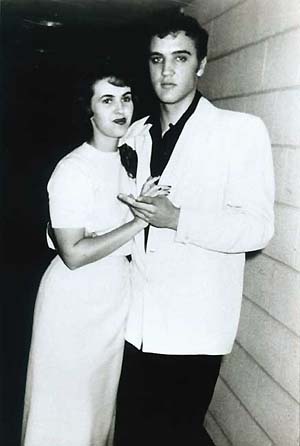
It was very innocent time, it was the
last days of america's innocence. By the 1960s things were already
changing, Vietnam, the hippies and folk music came to the fore.
But our music was innocent in the fact
that we were singing stuff about things that teenagers did. I was a
teenager, I was 17 when I started recording so we were talking about
proms and dances and riding in cars and stuff like that. Naturally it
could be taken another way I suppose, that depends on your mind where
you take a song more than what a song actually says. Maybe that's
just me.
It was innocent. Elvis sang about
Mystery Train and Good Rockin' Tonight, what we meant was dancing.
But somebody put a different meaning to that . . . but we didn't
know that.
It is always said that you and Elvis
dated. What did “dating” mean though?
It wasn't traditional dating where he
drove to my house, picked me up and then later drove me home. It was
when we were on the road – and I like to be sure I preface this by
the fact my father travelled with me and acted as my road manager and
business manger and career advisor, he did it all.
He gave up his job and they sacrificed
a lot so I could have this career. So him being with me made all the
difference in the world.
I had freedom to go out with Elvis and
afterwards to go grab a hamburger and drive around and talk, you have
to remember I was just 17 . . . and my dad thought the world of
Elvis. He really did.
He appreciated his talent, thought what
he was doing was great and was glad when Elvis talked to me. He and
Elvis got along fabulously and both were big kidders, so our dating
was actually was with [Elvis' musicians] Scott Moore and Bill Black and my daddy along and we'd go
out and eat.
Sometimes [Elvis and I] would take
in a matinee movie if we got into a town early where we could sneak
off for a little privacy. We were very good friends but it was all
innocent and I'm proud of that fact.
Was Elvis aware of what was happening
around him, how big he was becoming?
Yes, because by then he was 21 and he
was very smart and was never given any credit probably, but he had a
real handle on what he was doing and where he was going. He knew when
it was time for him to change his manger from Bob Neal to Colonel
Tom. I didn't like his choice, but most definitely it was time he had
someone who could handle what was happening to him. But I'm sure it
could have been part of his over all plan.
But he gave me good advice, and others
encouragement. He was smart in his business dealings or at least what
he was doing in his career.
Let's turn to your career. In recent
years you've had good advice and a lot of support too – like the
album with Elvis Costello and the Cramps and others.
It was a shock because CMH records --
which was not a big company, a specialty company – asked if I would
be interested in making an album and by that point it had been 20
years since I had done an in-studio album in America for America. I'd
been recording for years in Europe.
So I said yes and it started off as a
bluegrass album and I was getting bluegrass unplugged material –
and it began to change and they are calling and saying 'The Cramps
just called us and they got word you are recording and want to be on
the album free, gratis. They are fans'.
I knew their name but didn't know their
work – but it was pretty wild when I found out what they they did
record! But I thought I would love to have them – and Dave Alvin
the same thing, we didn't contact anyone, they all called the
producer or record company and said they wanted to be on with me.
It was a total shock to me, and a
pretty heady trip.
And now Jack White. I understand you
have covered Dylan's Thunder on the Mountain? I've seen him play that
a couple of times and he does it in a rockabilly style . . . .
although there are probably more words on that one song than on most
albums you've done.
How did you even know of that?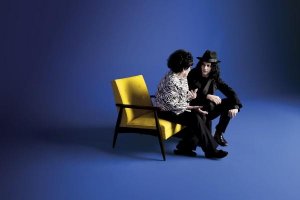
It was on a website.
Probably on Dylan's. Jack called him
knowing he was a fan and they are good friends and I had found out
through his satellite radio programe that he was a fan. Jack asked
him for ideas and he quickly said 'Thunder'. But 15 verses! I thought
I would never finish singing that.
But Jack has asked me to please don't
talk about it or tell what songs we've done because he wants it to be
a total surprise to the whole industry as well as to fans. I can tell
you it's now in the can and he's mixing it this month and I'm hearing
the final mixes and it's getting real exciting to me.
This young man is so creative and
talented – to be able to work with a young person with all this
enthusiasm and creativity, it's been a shot in the arm for me.
Is that think you appreciate? Working
with enthusiastic younger people.
It's what's kept me touring as much as
I do. I've always loved to travel and entertain live audiences more
so than television. For a while I was doing a week here and there at
a country show in Branson, Missouri. And I found I wasn't looking
forward to that very much – because even though those audiences
were gracious and accepting and all of that, they weren't the young
people with that enthusiasm they have.
So I didn't do that show for too long
because I need that energy. I get waves of love and respect and
enthusiasm [from young people], and you can't beat that, right?
If we could bottle that we'd make millions.

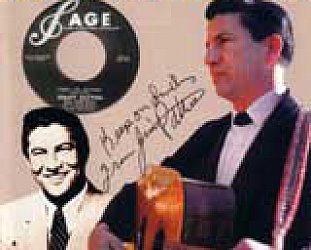
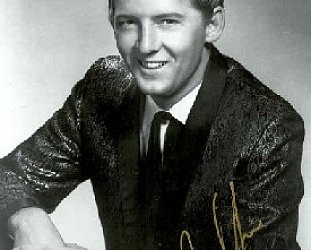
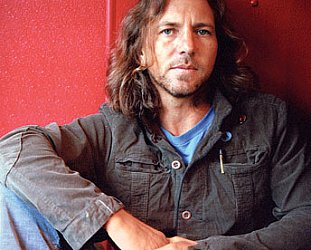

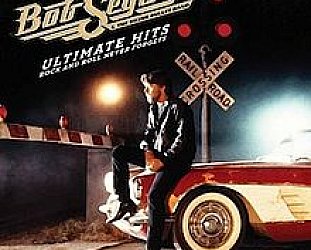
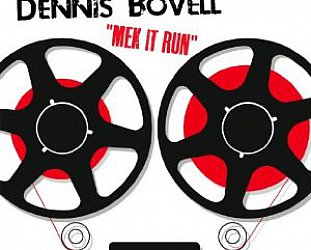
post a comment